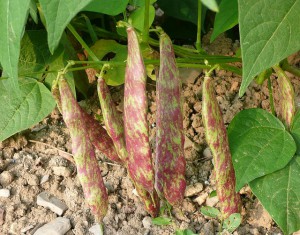Pollinators increase with landscape diversity on organic farms
In a recent study published in Agriculture Ecosystems and the Environment, scientists found that pollinator services to crops on organic farms increased when habitat heterogeneity was increased, but this same trend was not seen on conventionally farmed land. Researchers compared pod development in beans on conventional farms and organic farms surrounded by varying amounts heterogeneous habitat as determined by the amount of surrounding land set aside to grow hay or grass. Pots of beans were then placed in each field and monitored for indicators of successful pollination in the form in the number of bean pods that developed as well as the total number of beans per pod. Overall, organic farms had more pods per plant than conventional field, suggesting that more successful pollination was occurring in organic fields. They also noted as the amount of habitat heterogeneity increased, so did the number of beans in each pod—demonstrating that pollination services in organic fields also increases as the landscape became more diverse. Surprisingly, this increase in pollination services with habitat heterogeneity was not observed in conventional farms. The authors hypothesized that it may be that organic farming is simply friendlier towards pollinators because it does not use synthetic herbicides or fertilizers.




